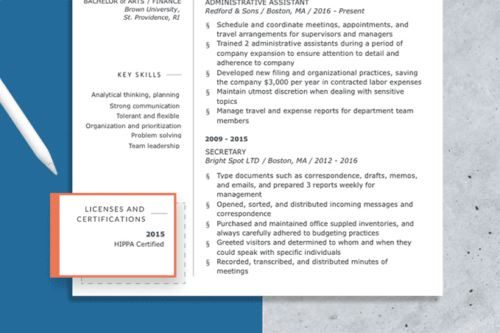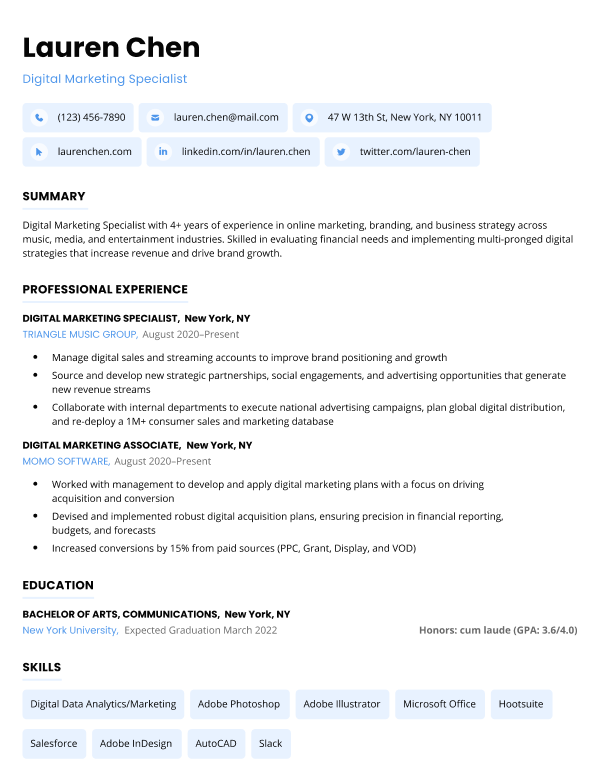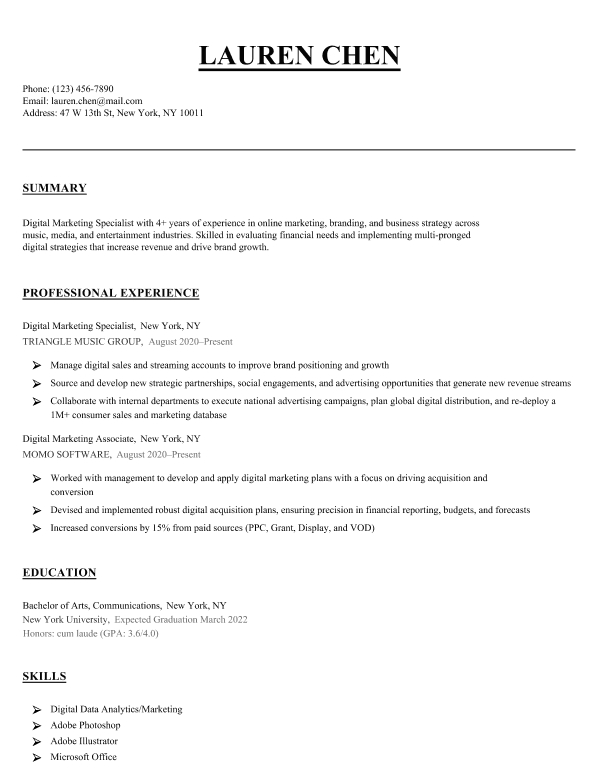If you’re a career changer looking to enter a new field, a recent college graduate applying for your first job, or an ambitious professional looking to take the next step in your career, acquiring an in-demand certification can help you land the job you want.
Below we’ll go over when, where, and how you should list certifications on your resume to prove to employers that your qualifications make you the ideal applicant.
Our free-to-use resume builder can make you a resume in as little as 5 minutes. Just pick the template you want, and our software will format everything for you.
What are certifications?
Certifications are credentials that prove you have the knowledge and training necessary to do a particular job or task. In fields like healthcare, having a certification or license is almost always required. In other fields, they’re not a necessity but can make your resume look more impressive to employers.
Some well-known certifications include:
- CompTIA A+ – This is an entry-level certification popular among employers in the IT industry.
- CPR – If you’re looking for a job in health care, you’ll need a CPR certification on your resume.
- Google Ads Search – Get a Google Ads Search certification to advance your marketing career.
- PMP – This is one of the most popular certifications in project management globally.
- Microsoft Office Specialist – Consider acquiring a Microsoft Office certification if you’re an administration professional.
- Notary Public Certification – A notary public certification can help you land a job as an administrative specialist.
Even if having a certification isn’t mandatory in your field, obtaining one shows employers that you’re a proactive, motivated job seeker and an effective employee.
You can find online certification programs on websites like Udemy, Coursera, Hubspot Academy, and MOOC.
When you should list certifications on your resume
Listing certifications on your resume isn’t always required. Unless they prove you possess the skills necessary to do the job you’re applying for, it’s better to leave them off your resume to save space.
But there are three circumstances where listing certifications is either expected or could strengthen your application when you’re making a resume for a job:
1. An employer requires specific certifications
If a company requires certifications for a particular job, you reduce your chances of being hired if you don’t list those certifications clearly on your resume.
In most cases, the job advertisement mentions what certification or license is needed, but you should also research the industry to check for other relevant certificates you can list.
Onetonline is a good place to look if you aren’t sure, and you can also explore other job postings in your target industry.
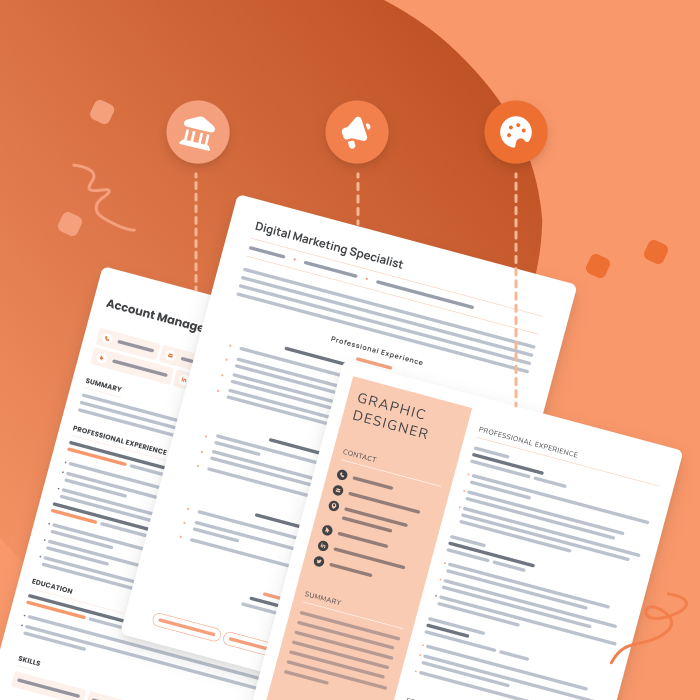
Resume examples for different industries
Not sure what your resume should look like? The best way to learn is by taking inspiration from resume examples written by other candidates in your industry.
2. You want to showcase skills relevant to the job
If you have certifications that aren’t needed for the job (but could be helpful), include them to make your resume stand out. For example, you can list CPR and first aid certifications if you’re applying for a job where you’re frequently around customers.
3. You need to make up for a lack of work experience
If you’re looking for your first job in an industry and have no professional experience, listing the correct certification can help you get a foot in the door. If, for instance, you were trying to find your first job as a caterer, it would make your resume stronger to add food safety certifications.
How to put certifications on your resume
Every certification you list on your resume requires the following information:
- Name of the certification
- Name of the organization that awarded it
- Date earned
- If completed in person, the location (city, state)
- If completed online, just write “Online Course” or the name of the certification provider
Good example
Spanish Diploma Level C1
DELE
Online Course / 2018
Bad example
Spanish Diploma
2018
You can also include certifications that you’re currently working on by adding “In Progress” next to the name of the certification, and including the date you’ll complete it.
Where to put certifications on a resume
There are three places where you can put certifications on your resume:
1. Certifications section
If you have numerous certifications that you want to showcase, list them in their own dedicated section. If the resume template you chose doesn’t have a section for certifications, simply add it below your skills section using the header “Certifications.” This way, you ensure the reader sees them right away.
Where you list your certifications depends on how important they are to the job you want.
If they’re required or highly relevant, put them near the top of your resume below your resume summary, like this:
This nursing candidate listed their certifications to ensure the hiring manager knows they have the qualifications needed for the position.
If certifications aren’t required you can place them toward the bottom of your resume beneath your education section, like this:
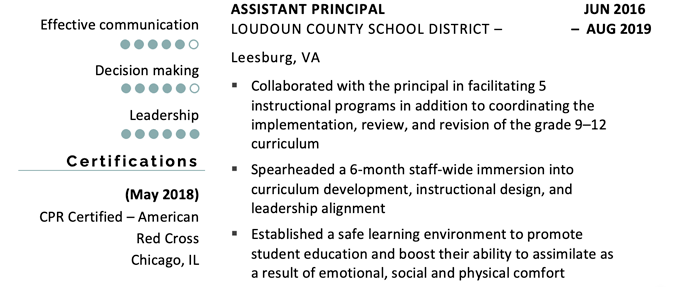
2. Skills section
Alternatively, if you need to save space and only have one or two certifications, change the title of the skills section of your resume to “Skills & Certifications” and list them there.
Here’s an example of what this looks like:

3. Resume summary
If you have a job-critical certification, mention it in your resume summary or resume objective at the top of your resume. This way, hiring managers immediately see that you’re qualified for the role.
Here’s an example of what including a certification in your resume summary looks like:

This candidate shows they have the necessary qualifications for a financial analyst position by stating they possess a CFA certification in addition to their other skills, education, and work experience.
Resume certification examples
By now you should know whether you need to include a certifications section, what to put in it, and where you should put it on your resume.
To give you a clear idea of what your own certifications section should look like, here are two examples taken from a sales resume and an HR resume.
Completed certification example (sales)
CERTIFICATIONS
MEDDIC CERTIFIED
Meddic Sales Methodology Academy
Online course / 2019
SANDLER SALES, SILVER CERTIFIED
Jane Smith Enterprises LLC
New York, NY / 2018
SPIN SALES TRAINING
John Miller International
New York, NY / 2017
In progress certification example (HR)
CERTIFICATIONS
SHRM CERTIFIED PROFESSIONAL (in progress)
Society for Human Resource Management (SHRM)
Chicago, IL / January 2021
PROFESSIONAL IN HUMAN RESOURCES (in progress)
Human Resource Certification Institute (HRCI)
Chicago, IL / March 2021
PROJECT MANAGEMENT PROFESSIONAL (in progress)
Project Management Institute (PMI)
Online course / May 2021
Click to rate this article
4.9 Average rating


